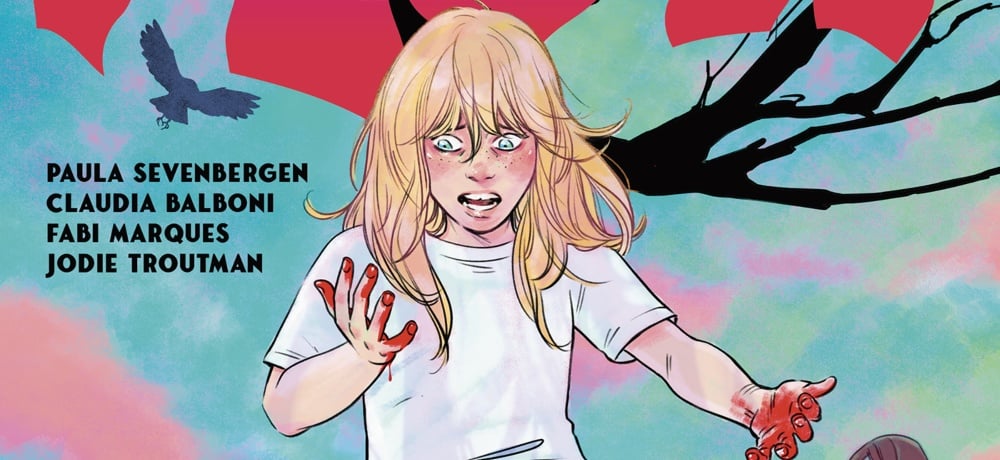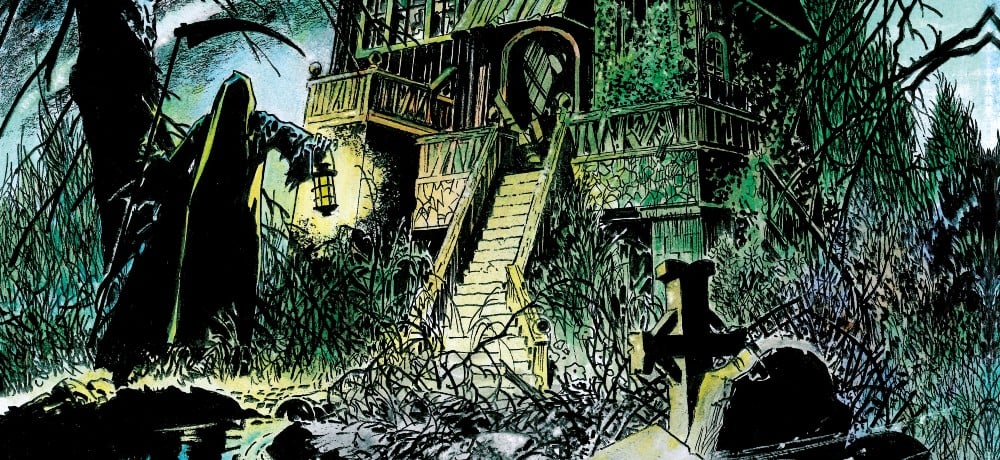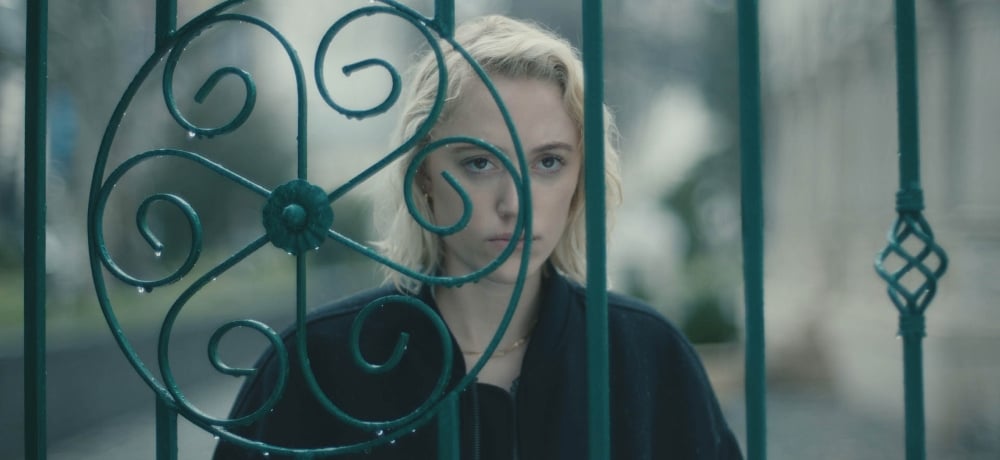






This past weekend, director Chloe Okuno celebrated the world premiere of her debut solo feature (she was at the helm of last year’s memorable “Storm Drain” segment in V/H/S/94 featuring fan favorite Raatma), Watcher, which stars Maika Monroe as a young woman who moves with her husband to Bucharest for his job, but she finds herself increasingly paranoid when she suspects that her neighbor is constantly watching her and stalking her around town.
Daily Dead recently had the opportunity to speak with Okuno about Watcher, and during our interview she discussed the evolution of the project over the last few years, how a last-minute change of setting ended up being a gift for the story she was telling in the film, her experiences collaborating with genre favorite Maika Monroe on Watcher, and more.
So great to speak with you today, Chloe, and congratulations on Watcher. I would love to start at the beginning and talk a little bit about how this came about. Was this a project written by Zack Ford and then you came on? Or did things work out a different way?
Chloe Okuno: Yeah, so basically in 2017, I was hired onto this movie, and this was an original script by Zack. And then essentially, I gave him some notes, he did a draft, and then I took over and started doing my own drafts of the script to try to help develop the character of Julia. There ended up actually being a very interesting evolution to the story over the five years that we were working on it until we moved into production.
Oh, interesting. So how did it then evolve in terms of where it was and where we see it now in the final version of the film?
Chloe Okuno: I'd say the two biggest ways were one, in the original script, it was a little bit more of a two-hander between Julia and Francis. And then Roy Lee, who is obviously a legendary horror producer, came onto the project and he had this completely brilliant idea that spoke to what I was already feeling but was too afraid to voice myself, which was that we should just commit to this as Julia's movie and make it all from her point of view. I think that he saw this as spiritually something more like a psychological thriller, like Rosemary's Baby, and I thought that was 100 percent right, that's what I wanted to do here. So that ended up being a pretty big shift.
And then the second biggest shift I think was when I heard that we were going to go shoot it in Romania. Initially, the script was set in New York City. But when I heard that we're doing production in Bucharest, I rewrote it to take place in Bucharest, and you've seen the movie, so you know that that ends up being quite a big part of the story and a big part of the emotional landscape of our protagonist, Julia. And it's just one of those things that ended up being a practical necessity, because I don't think Bucharest stands in very well for New York or for anywhere in America. So that was the other big change.
You mentioned Rosemary's Baby, and we've seen other stories about female paranoia before, but I enjoyed how you married that concept with this whole “stranger in a strange land” vibe, which really heightened everything. While watching this, I was just thinking of where we are as a society today, where women are still struggling to be heard, we're still struggling to be validated, and we're still trying to fight for people just to accept our truths, if that makes sense. Did it resonate with you that you were making something that felt timeless but timely as well?
Chloe Okuno: Yeah, I knew going into Watcher that in some ways we're treading well-worn territory. There have been a lot of psychological thrillers around women and building paranoia of not being believed, but at the same time I felt like that story still is something that I've experienced firsthand and I felt so strongly about, and I felt like there were some details that I could bring to it based off of my own experience that maybe we hadn't necessarily seen before. Or even if we had, we're looking at it through a different lens now. And I'm so happy that that seems to be resonating with people. A lot of women who I talk to, one in particular, I think said that she was crying with rage at some of the situations that Julia finds herself in.
I would imagine it's because she's been there herself. I've been there myself and it's always very infuriating, where you’re just standing in a room, surrounded by men who don't believe you or are doubting your credibility or just generally taking a patronizing stance towards you. I think it's something unfortunately that most women have felt at one time or another. So yeah, I wanted to make the genre version of that story and capture why it's truly so infuriating, and sometimes just so lonely and isolating. And I think just the fact that Julia was in this new country works to the story's advantage, in addition to all the reasons why she was feeling like she was isolated because she wasn't believed, she also was isolated because she couldn't really speak the language. So I hope that all comes across, and I hope that people connect with it. Certainly, that was the aspect that I really connected with most strongly.
You mentioned shooting in Bucharest and how it feels like the singular location, and I think Benjamin’s [Kirk Nielsen] cinematography captures that singularity really well. I also loved how in so many of the shots Julia feels so small compared to everything around her, too. I was wondering if you could discuss collaborating with Benjamin in creating the visual style of Watcher?
Chloe Okuno: Oh, thank you so much. Yeah, it's something that Benji and I talked about from the very beginning. We wanted to make Julia feel small, put her in these shots where she's very tiny within the frame to visually show her isolation and reflect the fact that the world itself was a little bit overwhelming. I also made sure to try to choose locations that evolved the architecture. Bucharest is really unique and they have this mix of more classically beautiful Parisian style architecture, and then right next to it, you have these very oppressive Soviet buildings. So at the beginning of the story, I think I tried to find places that looked a little bit more familiar to Western audiences because I think people find some weird comfort in Western European architecture.
And then as we go further in, we're trying to choose places that have a little bit more of that severe Soviet look to it, just so you feel like maybe that's an undercurrent to what she's feeling and just the oppression of the architecture around her is closing in on her. And yeah, certainly we're trying to tell a whole story, not just with composition, but even our choice of lenses, too. We used Hawk Vantage One lenses, which are able to have Julia feel particularly separate from the background. And again, everything we're doing is really in service of just telling that story and having people feel it without us even having to say anything.
Before we go, I would love to discuss Maika’s performance here, because she is astoundingly great in this. I thought it was really interesting as I was watching how she carries herself in the movie changes throughout as she's dealing with everything and even her wardrobe begins to reflect what’s going on with her mental health. How was it collaborating with her?
Chloe Okuno: Yeah, Maika's phenomenal. I was a big fan of hers from It Follows and The Guest and obviously I was so thrilled when we got her for this movie, and she really did bring this simmering frustration that just felt so true and real to me. I think a lot of our work together was about making sure that we're tracking how that's growing throughout the scripts. And yeah, when she first gets there, a lot of it was like we were paying homage to Lost in Translation with this American girl in a foreign city who is looking around wide-eyed, and it's all very exciting, even if it's also a little overwhelming. But then, as the movie goes on, I think Maika was so amazing at just capturing how her character is physically affected by what’s happening, like what you're saying, where she's hunching over, almost on herself.
She's so amazing and I feel like that work in terms of her character is very honest. I think that comes from our discussions early on, even about how the movie is going to look. I told her at the beginning of this movie, we're going to put you in these bright red colors, you are a person who's bold and isn't afraid to stand out in your environment, and then as we go on, I'm going to put you in more of these earthy neutral tones that are designed to literally match the walls of our set or match the locations that we're choosing. So it's like she's literally trying to disappear as she feels the eyes of the watcher on her and just her unease grows.
So I felt like Maika was just particularly brilliant at internalizing those kinds of things and making sure her performance is speaking to the movie that we're trying to make. I think her performance in this is really staggering, I think she's so good in this and everything in this movie is about seeing it through Julia's eyes, it's about feeling what she feels, and she really just carries us all the way through to the very end.
---------
Go HERE to catch up on all of our coverage of the 2022 Sundance Film Festival!
[Photo Credit: Above photo courtesy of Sundance Institute.]